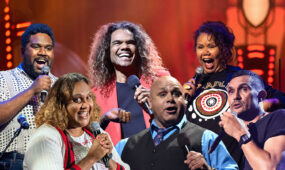Playwright challenges the rise of the extreme right
Adelaide Fringe
Playwright Henry Naylor says his new play Games, showing at this year’s Adelaide Fringe, is a timely reminder of how right-wing populism can go very wrong.

“There have been viewpoints expressed that I just haven’t heard in my lifetime recently,” Naylor tells InDaily, reflecting on the global rise of the far right in the wake of Brexit and what he describes as the upsurge of the “Pauline Hansons of Australian politics”.
“I wanted to do something about the rise of the far right – a piece that reminded people where right-wing populism can lead and the implications of some of the inhumane policies that people have been preaching.”
The weekend’s far-Right-organised rally in St Kilda, with protestors shown giving Nazi salutes and shouting racist remarks, is an example of what Naylor says is a “scarily real” rise in right-wing extremism across the globe.
The British playwright first honed his craft as a comedy writer on seminal British sketch shows such as Alas Smith & Jones, and rose to prominence in the UK as the lead writer for Spitting Image, the cult ‘rubbery figures’ send-up of Thatcher’s Britain.
But his recent work, writing for the stage, has focussed on conflicts in the Middle East, including his work Borders, which received rave reviews at last year’s Fringe.
This year, Naylor will return to Holden Street Theatres to present his new duologue Games, described as a “cautionary tale for our times” that retells the lives of Jewish-German athletes Helene Mayer and Gretel Bergmann ahead of the 1936 Olympic Games in Nazi Germany.
“It’s a piece not just about anti-Semitism but about how we treat each other,” Naylor says.
“These are tragic stories but they’re also real stories and there’s a certain element of grit and appeal for audiences that makes them want to find out about their lives.”
According to Naylor, Mayer was “the David Beckham of Germany in the 1930s”.
She was a gifted fencer, having won the gold medal at the 1928 Olympics in Amsterdam. But, the anti-Jewish laws put in place when Hitler seized power in 1933 forced her to flee to America.
Mayer accepted an invitation from the Nazis to compete for Germany at the Berlin Olympics, where she won a silver medal in the individual women’s foil. She gave a Nazi salute on the podium, later revealing that by doing so, she might have protected her family that were in Nazi labour camps.
“The Nazis had set up the event to basically make her lose and yet she just smashed it,” Naylor says.
“It’s an extraordinary story that really shows the horrible things the Nazis did to sportspeople who had dedicated their life to their sports.”
Unlike Mayer, high jumper Gretel Bergmann was unable to flee Germany in the lead up to the Olympic Games.
Despite having been denied access to proper sporting facilities in the lead up to the Olympics, Bergmann continued to train on an old potato field and won several international titles, but she was ultimately refused a place on the German Olympic team.
“The problem that modern audiences have with things like the Holocaust and Nazi Germany is that they just hear the numbers,” Naylor says.
“Everybody knows that an enormous number of people died and an enormous number of people were exposed to the horrors of the death camps, but what people are failing to do is to connect those numbers with real people and real tragedies.
“That’s what as happening with the Syrian Crisis as well. We were hearing that half a million people were crossing the Mediterranean and thousands were dying, but we weren’t connecting to it emotionally.
“I think Games presents a certain degree of fascination with the past so that audiences can learn from those historical events and individual stories to avoid history repeating today.”
Naylor’s sentiment comes at a crucial time, with Brexit sparking a new wave of anti-immigration sentiment and parties on both sides of the British political spectrum weighing in on controversial racial policies.
“It was remarkable because the week we opened at the Edinburgh Fringe there was a huge scandal with the Labour Party, which led to them refusing to accept established international definitions of what anti-Semitism was,” he says.
“That just goes to show that it’s not even just the right-wing. In Europe, the Labour Party is traditionally the more tolerant of the two parties and the one that is vehemently anti-racism.
“This is why it’s important to have plays like Games at the moment.”
But, Naylor concedes there is a limit to pushing political messages through art.

Get InReview in your inbox – free each Saturday. Local arts and culture – covered.
Thanks for signing up to the InReview newsletter.
“I think one of the dangers of doing artistic works is that you end up preaching to people who already share your views,” he says.
“Generally liberal-minded empathetic people are the ones who go to the theatre and so your message is probably falling on an audience who already agrees with your perspective.
“But, I don’t think that’s a problem. I think it’s important for the liberal-mined people to have ammunition and the arguments to support their liberal and humane theories.
“If nothing else, it’s reminding us to be empathetic by reinforcing a humane viewpoint.”
Games by Henry Naylor will be performed at The Arch at Holden Street Theatres from February 12 to March 16 as part of the Adelaide Fringe.
Support local arts journalism
Your support will help us continue the important work of InReview in publishing free professional journalism that celebrates, interrogates and amplifies arts and culture in South Australia.
Donate Here





Comments
Show comments Hide comments